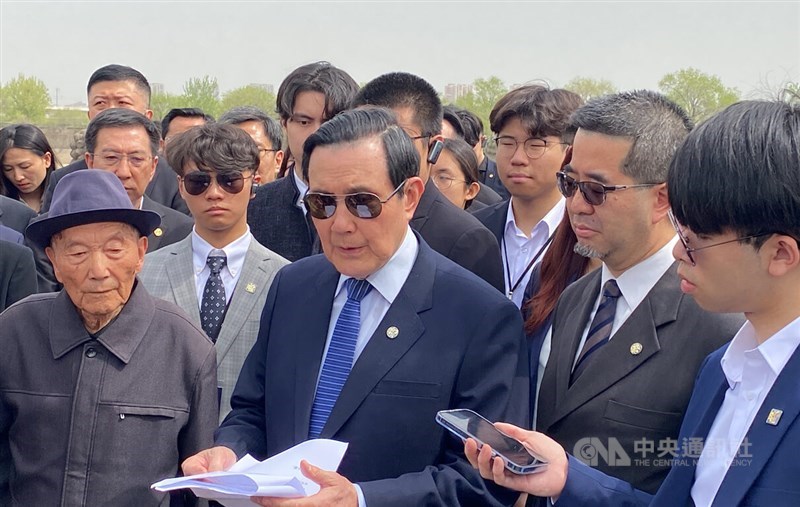Ex-President Ma highlights '92 consensus in meeting with CCP official

Beijing, April 8 (CNA) Former President Ma Ying-jeou (馬英九) on Monday highlighted the "1992 consensus" as the political cornerstone for Taiwan and mainland China to put aside their differences while seeking to bring benefit to the two sides of the Taiwan Strait.
Given the complex relationship between the two sides forged by history and practical engagement, the "1992 consensus" represents a shared foundation in the fight against Taiwan independence and the creation of a win-win scenario based on mutual trust, Ma argued.
"During my tenure (as president), the two sides clinched 23 agreements and realized direct links, benefiting the people on both sides," Ma said in a meeting with Yin Li (尹力), the Chinese Communist Party's (CCP) secretary for Beijing, in the Chinese capital.
The consensus was a tacit understanding reached in 1992 between the then Kuomintang (KMT) government of the Republic of China (Taiwan) and the Chinese government, according to the KMT, of which Ma is a member.
The KMT has described it as an acknowledgment by both sides that there is only "one China," but with each side free to interpret what that "one China" means.
Beijing, however, has never publicly recognized the second part of the KMT's interpretation, and Taiwan's ruling Democratic Progressive Party (DPP) has rejected the formula, saying it implies that Taiwan is a part of China, as Beijing claims.
Turning to the Economic Cooperation Framework Agreement that the two sides signed in 2010, Ma said that even the DPP is not willing to rashly terminate it, an indication that practical economic and everyday exchanges cannot be cut off by politics.
He voiced the hope that the two sides, in particular young people, would continue to interact to contribute to peaceful cross-strait development. "And this is the reason why I'm leading a youth delegation on this visit to mainland China."
Ma mentioned his visit earlier in the day to the Museum of the War of Chinese People's Resistance Against Japanese Aggression, which stands next to the Marco Polo Bridge.
The Sino-Japanese War was the prelude to World War II in the Pacific.
He said the Chinese people must be self-reliant and strong enough to strive for the continued survival of a Chinese nation.
Yin praised Ma for his adherence to the "1992 consensus" and his opposition to Taiwan independence.
Yin also expressed condolences to Taiwan, which was rocked by a magnitude 7.2 earthquake on April 3. He said Beijing was willing to assist in Taiwan's post-earthquake efforts.
Leading a 20-member delegation of college students, Ma is currently on a visit to China from April 1 to April 11, which has taken him to Shenzhen and Shannxi Province, in addition to Beijing.
- Society
Thousands of Muslims gather across Taiwan for Eid al-Fitr prayers
04/10/2024 05:13 PM - Politics
New Cabinet to respond to domestic, global challenges: Lai
04/10/2024 04:55 PM - Society
Electronic pet ID card launched by agriculture ministry
04/10/2024 04:51 PM - Business
U.S. dollar closes lower on Taipei forex market
04/10/2024 04:11 PM - Business
TSMC reports highest sales for Q1
04/10/2024 03:52 PM